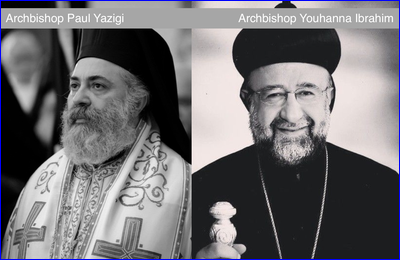


A seminar, organized on the anniversary, will take place under the patronage of Yohanna X, Greek Orthodox Patriarch of Antioch (who is also the brother of the late Metropolitan Boulos Yazigi and current President of MECC) and Mor Ignatius Aphrem II, Syriac Orthodox Patriarch of Antioch. At the end of the commemorative seminar, the declaration to proclaim April 22 as "Ecumenical Day for the Abducted and the Forcibly Absented" will be read.
The seminar will begin with a joint statement issued by the Patriarchates of Antioch and All the East for the Greek Orthodox and Syriac Orthodox Churches. The seminar also includes testimonies via video for some kidnapped victims and will end with two messages via video from His Beatitude Patriarch Yohanna X and Holiness Patriarch Mor Ignatius Aphrem II.
The two metropolitan bishops of Aleppo were kidnapped in the area between the Syrian metropolis and the border with Turkey. The car in which the two Bishops were traveling was blocked by the group of kidnappers and the driver - the Latin-rite Catholic Fatha' Allah Kabboud, father of three children - who was shot in the head. The kidnapping was not claimed by any group, and since then no certain and verified details have emerged regarding the reasons for the kidnapping and the fate of the two clergymen. Over the years, rumors and news announcements were filtered around the case on several occasions, which later proved to be unfounded.
In August 2013, the leaders of the Syriac Orthodox Church had to issue a statement to reject with outrage the insinuations spread by some local media that pointed to possible intra-ecclesiastical rivalries and envy among the causes of the kidnapping. Six months after the kidnapping, General Abbas Ibrahim, head of the Lebanese General Security, claimed the place where the two kidnapped Bishops were being held had been identified, and said "indirect contacts" had begun with the kidnappers to obtain their release. These claims were not followed by concrete evidence.
In January 2020, an investigation carried out by an investigative team led by Mansur Salib, a Syrian researcher residing in the USA, and disseminated through the digital platform medium.com, exposed a reconstruction of the case according to which the kidnappers and then the two archbishops were militants of Nour al-Din al-Zenki, an independent group involved in the Syrian conflict, financed and armed during the conflict by both Saudi Arabia and the US. According to the authors of the investigation, the two archbishops had left Aleppo on April 22, 2013, with the intention of going to negotiate the release of two priests, Armenian Catholic Michael Kayyal and Greek Orthodox Maher Mahfouz, who had been kidnapped earlier by anti-Assad jihadist groups then controlling territories east of the Syrian metropolis.
The investigation published on medium.com suggested that figures connected to MIT (Turkish intelligence service) were involved in the kidnapping. The reconstruction reported news that was already known, along with inferences exposed without objective evidence. In the final section, the investigation claimed that the two bishops were killed and buried in an unspecified location only in December 2016, as areas east of Aleppo were being recaptured by the Syrian army.
On January 20, 2020, in a joint statement released on social media, the Greek Orthodox and Syriac Orthodox Patriarchates of Antioch reported that they were unable to provide useful elements to confirm or deny the "disturbing reconstructions" circulating around the kidnapping of the two Metropolitans of Aleppo, and called such reconstructions as initiatives "totally independent of the efforts we made in the search for our two missing archbishops".
During the ten years that have passed since their kidnapping, the memory of the two kidnapped bishops has been kept alive at all times through processions, prayer vigils, bishops' statements and public demonstrations.

or register to post a comment.